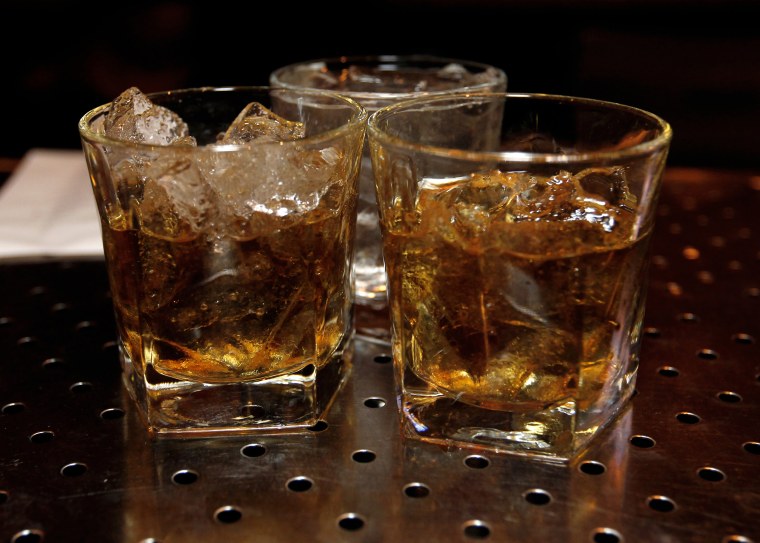While some may be tempted to say they minored in alcohol while in college, a new course in Bourbon Studies at Midway University in Kentucky can now make that boozy claim legitimate.
Samantha Weldon of Louisville, Kentucky, is the first graduate of the program, which prepares students for careers on the hospitality side of Kentucky's bourbon tourism industry.
And that business is booming. Attendance at the Kentucky Bourbon Trail and Kentucky Bourbon Trail Craft Tour has more than tripled in the last decade, according to the Kentucky Distillers' Association, reaching 1.2 million stops at participating distilleries last year. KDA numbers show bourbon's economic impact on the area now totals $8.5 billion.
In the midst of this growth, a $1.2 billion building boom — including new tourism centers — is under way. The world seemingly can't get enough of Kentucky bourbon, and fans are flooding the region in search of unforgettable bourbon experiences.
To help meet that demand, professor of bourbon studies Tim Knittel is equipping students like Weldon to step into an industry that has historically been more about production and agriculture than hospitality and event management.
Though bourbon has been made in Kentucky for generations, the tourism side of the industry started experiencing massive growth after Woodford Reserve opened in 1996 and the bourbon trail was developed, Knittel told NBC News.
“We've seen effectively an entirely new industry created,” he said. "In much the way that Napa was created in the 80s and 90s in California.”
But Kentucky has never had tourism to the extent of Florida and New York, Knittel told NBC News. “Our hospitality has always been southern, it's never been intentional experience design.”
That's changing, he said, at least with new distillery visitor experiences like the highly polished Castle & Key, in Frankfort, which offers a castle tour, sunken gardens, and a botanical trail. This contrasts with the more homegrown approach of some other producers, which is more, “We have a distillery, come visit,” said Knittel, noting that in many instances the newer craft distilleries likely have no formal training in hospitality.
An added challenge for the smaller places without beautiful, historic properties, he said, is creating that magical feel of the heritage distilleries. “If you just have a little pot still and a couple of fermenters it doesn't look iconic. It doesn't even look very interesting.”
Even the larger distilleries that can write multimillion-dollar checks need a return on investment, said Knittel. They need people to understand hospitality and what service looks like.
"Understanding how to maximize value still requires an educated workforce and that's what this program is for,” he said.
Hospitality is so crucial, Knittel said, because even as consumers have ever more options when it comes to brown spirits — or any spirit — it serves as a “marketing mechanism for distilleries that has the potential of creating very deep engagement with the consumer. If done well it can create a consumer for life.”
For the love of bourbon
Weldon herself was so drawn in by bourbon hospitality that she and her husband picked up and moved from North Carolina to Louisville after visiting the Bourbon Trail several years ago. Though she didn't start out as a bourbon fan like her husband, they fell in love with the culture on that first trip, she said, and kept coming back.
“I was so taken with the Bourbon Trail and everything the industry was doing,” Weldon told NBC News. “It's always like, 'Pull up a chair and let me pour you a glass.'”
With a background in military service and network management, she'd recently finished her undergraduate degree in business administration and decided to tackle an MBA next. Then she heard the buzz about the new bourbon concentration. “I was like, 'I don't have experience but the industry and people are wonderful.' I said, 'You know what, I'm going to go ahead and enroll.'”
Through the coursework — which takes place online and includes bourbon tastings via conference call — she and the handful of other students learned not just the fun parts like how to lead tastings, but the detailed, behind the scenes work you don't think about, she said, like the giant binders that go into planning an event.
Their learnings are going to be key in the industry's growth, Weldon said. “As these distilleries open, there needs to be a talent pool. We can't all grow up in Kentucky or have an aunt or uncle who was in the business. How do you bring in people, and get them excited about being part of this huge and growing industry?”
The opportunity is unique to the area, she said, and will take more than distillery tours. “You can only make Kentucky bourbon in Kentucky. The tours have to be in Kentucky and you need restaurants to feed these people and you need bed and breakfasts and Airbnbs ... come live, stay, drink it all in.”
Beyond bourbon
“It used to be travel was about having an elite experience,” Knittel said. “It was about having wants taken care of. Now that's changing and travel is about authenticity of place."
And it's more than just checking the box on a distillery visit. The idea of expanded bourbon tourism will incorporate bourbon-adjacent industries, whether that's the Urban Bourbon Trail in Louisville, cigar rollers who are aging tobacco in bourbon barrels, restaurants that provide bourbon flights and education from bartenders, and Airbnb hosts who create a bourbon-related experience.
The ultimate goal, explained Weldon: “I want everybody to fall in love with Kentucky the way I did."
